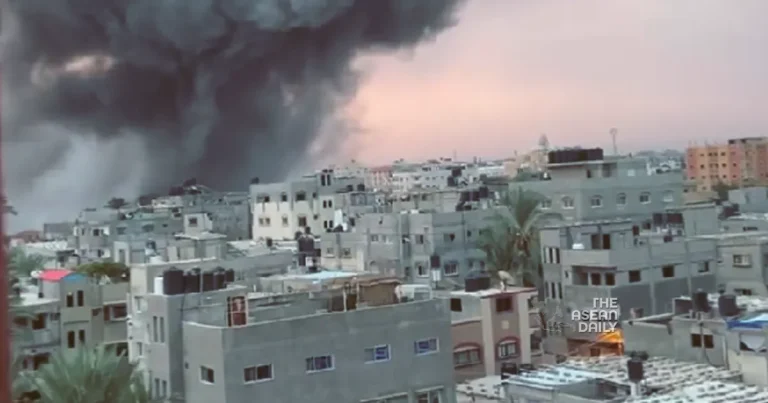9-5-2024 (RAFAH) The grim conflict in Gaza has taken a perilous turn as Israeli forces pounded the southern city of Rafah with airstrikes and artillery on Monday, even as negotiations to halt the seven-month-old war were underway in Cairo. The military confirmed that ground troops had conducted “targeted raids” in the densely populated area, defying international outcry over the incursion into the Palestinian enclave.
In a brazen move on Sunday, Israeli tanks seized control of the Rafah border crossing with Egypt, the principal conduit for humanitarian aid into the beleaguered Gaza Strip. The White House swiftly condemned the disruption to relief efforts, with a senior American official revealing that Washington had temporarily halted a shipment of bombs to Israel last week over concerns about the long-threatened Rafah operation.
While the Israeli military announced the reopening of two other crossings, Kerem Shalom and Erez, on Monday, the United Nations Relief and Works Agency for Palestinian Refugees (UNRWA) reported that the Kerem Shalom crossing remained closed, contradicting the Israeli claims.
The night brought a fresh barrage of heavy Israeli strikes and shelling across Gaza. Footage captured by AFP journalists showed Palestinians scrambling in the darkness to pull bloodied and dust-covered survivors from the rubble of a bombed building in Rafah, a haunting scene that has become all too familiar in this protracted conflict.
“We are living in Rafah in extreme fear and endless anxiety,” said Muhanad Ahmad Qishta, 29, his voice laced with desperation. “Places the Israeli army claims to be safe are also being bombed.”
In the devastated northern Gaza Strip, Al-Ahli hospital reported receiving the bodies of seven family members killed in a strike on an apartment in Gaza City, a grim reminder of the mounting civilian toll.
An emergency doctor working in Rafah and the nearby town of Khan Younis painted a bleak picture of the humanitarian crisis unfolding in the region. “The smell of sewage is rife everywhere,” said Dr. James Smith. “It’s been getting worse over the course of the last couple of days.”
The World Health Organization’s chief, Tedros Adhanom Ghebreyesus, issued a dire warning on Monday, stating that hospitals in southern Gaza had only “three days of fuel left” due to the border closures. “Without fuel, all humanitarian operations will stop,” he cautioned.
Meanwhile, the Hamas-run government media office reported a grim discovery at Gaza City’s Al-Shifa hospital, the territory’s largest medical facility, which was devastated by two weeks of fighting in March. Health workers uncovered at least 49 bodies in what was described as “a third mass grave,” according to Motassem Salah, head of the hospital’s emergency department.
The current crisis was sparked by Hamas’ unprecedented attack on Israel on October 7, which resulted in the deaths of more than 1,170 people, mostly civilians, according to an AFP tally of Israeli official figures. In retaliation, Israel vowed to crush Hamas and launched a military offensive that has claimed at least 34,844 lives in Gaza, predominantly women and children, according to the Hamas-run territory’s health ministry. Militants have also taken around 250 hostages, with Israel estimating that 128 of them, including 36 presumed dead, remain in Gaza.
As the violence rages on, talks involving Qatari, American, and Hamas delegations aimed at agreeing to a ceasefire continued in Cairo on Monday, according to Al-Qahera News, a media outlet linked to Egyptian intelligence. While the report noted “points of contention” during the discussions, it also mentioned some “convergence,” without providing further details.
A senior Hamas official, speaking on condition of anonymity, described the latest round of negotiations as “decisive,” stating that the group “insists on the rightful demands of its people.”
In Jerusalem, CIA Director Bill Burns met with Israeli Prime Minister Benjamin Netanyahu to discuss the “possibility of Israel pausing the operation in Rafah in exchange for hostage releases,” according to an Israeli official who requested anonymity.
The Hamas official had previously warned that the talks would be Israel’s “last chance” to secure the release of the remaining hostages held by militants.
Qatar, which hosts Hamas leaders and has been mediating between the two sides, issued an urgent appeal “for international action to prevent Rafah from being invaded and a crime of genocide being committed.”
Palestinian analyst Mkhaimar Abusada suggested that Israel’s seizure of the Rafah crossing could be an attempt to create new facts on the ground or a bid to “sabotage the truce talks.”
Prime Minister Netanyahu defended the Rafah operation as “a very important step” in denying Hamas “a passage that was essential for establishing its reign of terror.”
The decision by the Biden administration to hold back a shipment of more than 3,500 heavy-duty bombs last week marked the first time the United States had acted on its warning to Israel that its policy on Gaza would depend on how civilians are treated.
Adding to the region’s volatility, a Lebanese security source reported that two Hezbollah fighters were among five people killed in Israeli strikes on southern Lebanon on Monday. The Palestinian militant group Islamic Jihad claimed the other three fatalities as its own members, raising fears of a wider conflict erupting in the region as cross-border exchanges between Israel and Hezbollah continue in the wake of Hamas’ October attack.




